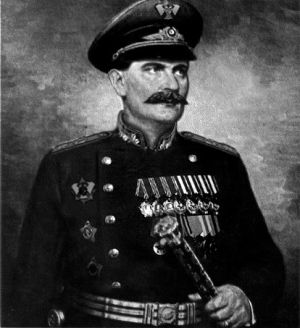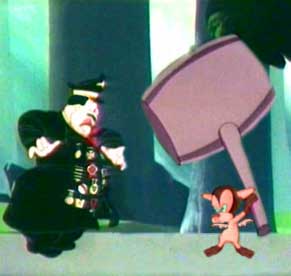Vissarionov
Iosif Vissarionov was a Russian dictator, Chairman of the White Council, President of the SNOR and Supreme Leader of the Russian People from 1937 until his death in 1958.
History
Iosif Vissiarionovich Vissarionov was born in 1881 near Penza, the son of farmers. He was radicalized by the Black Hundreds in his youth but quickly quit it, believing that it was too radical. He then saved some money to enter a military school but was unable to do so, forcing him to enlist directly to the army as a private instead, quickly rising through the ranks during the First and Second Russo-Japanese Wars, in which he became a lieutenant. He then made contact with Russian nationalists and despite his own admission that he is not a good writer, was eventually made an editor of the Russian nationalist newspaper Pure Truth in 1910.
During the First Great War, he served in the Southern Front against the Ottoman Empire and when he was offered a place in the White Movement, Vissarionov jumped at the chance and was a general in the Caucasus front during the Civil War. After the White Victory, he became the governor of Penza Oblast and tried unsuccessfully to gain a higher position in the government, believing that he is destined for a better future.
In 1937, admiral Kolchak, the Supreme Leader of the Russian Empire, died of old age. He was succeeded by general Iosif Vissarionov. When Generals Denikin and Kolchak had first met Iosif Vissarionov, they had only raised their eyebrows, when the young son of a farmer showed up in their ranks. Vissarionov was often the butt of private jokes as the generals watched his attempts to obtain a minor position in their government. Despite their feeling of mockery, they nevertheless gave him a position. Twenty years later their laughter would eventually sour. When Denikin and Wrangel were forced to confess to any number of crimes - including communist sympathies and cooperation with Western secret services - in one out of many show processes that lead to the death penalties for them.
It was Vissarionov who eventually helped Russia through the Second Great War. In the aftermath he to expanded his control over much of Eastern Europe by setting up puppet states.
During the last years of his life, Iosif Vissarionov suffered from severe paranoia. He surrounded himself with sycophants, and his regime became more and more oppressive. In response to the outrageous amount of terror and violence he used against his subjects, popular discontent grew. The national minorities, tired of the severe russification programmes and inspired by the developments in Estonia and Hungary, started demanding autonomy. In several places riots broke out.
When Vissarionov eventually died in 1958, he was most or less automatically succeeded by his personal aide, general Andrei Vlasov
Note: Iosif Vissarionov should not to be confused with Iosif Vissarionovich Dzhugashvili, a radical priest in Georgia sometime known as "Stalin".
In Popular Culture
Vissarionov was a a frequent source of humour in western media and an easy person to caricature. He can be seen to the right in a still from the 1939 cartoon "Scales & Hairs" (staring Derek the Dragon) where he is depicted as a buffoonish blowhard.
This cartoon, although popular, was not seen for quite some time as it was considered "too political". Bootleg copies of it circulated during the 1960s and was popular with anti-snorists groups especially on university campuses.
| Preceded by: Aleksandr Kolchak |
Supreme Leader of the Russian People |
Succeeded by: Andrei Vlasov |

